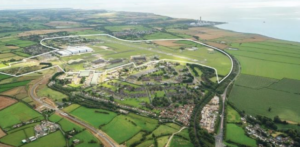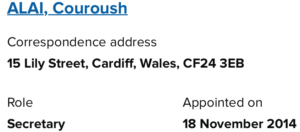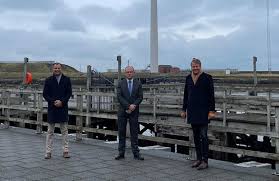- Return to sender - 20th February 2026
- Legal eagle - 19th February 2026
- Round Robin - 19th February 2026

Shocking news that £1 billion in public money is to be used for a huge new electric car battery plant, highlight concerns about funding given for another firm which also offered multi-million pound plans (this time for Wales), but abandoned them soon afterwards, had a director with an interesting past which was exposed by The Eye, and our story about them attracted threats of legal action despite the fact that all information was in the public domain.
This is the message received by us from a founder and former director of the business which had proposals for the Vale of Glamorgan (VoG), British Volt (BV): “Your latest article is full of lies and made up bullshit. We intent (sic) to take legal actions against your publication. Lars Carlstrom“.

This menacing announcement came even though the piece was approved by our libel lawyers who noted that all information was in the public domain anyway.
Yet it appears that taxpayers’ money is still being flung at ventures which promote a supposed bright future for Electric Vehicles (EVs).
The UK Government told us proudly last week: “Working people will benefit from 1,000 jobs at a new state-of-the-art gigafactory in Sunderland in a £1 billion auto deal to accelerate the transition to electric vehicles and boost growth”.
Here, then, The Eye re-publish our story from last year which prompted the threat of legal action:
–

Recent crisis news about the future of a large car battery firm, as well as problems facing Electric Vehicles (EVs) generally, strengthen doubts concerning a company which proposed a multi-million pound scheme for Wales but scrapped it, and had a dubious individual as a director. British Volt (BV) ditched a planned site in South Wales, even though its proposals had been greeted with huge fanfare by politicians and reporters in the Welsh mainstream media.

Europe’s EV sector has been struggling as consumer demand for greener vehicles fails to increase quickly enough, and industry figures have revealed that the number of cars sold in the EU fell to 643,000 in August.
Reflecting this the Swedish battery maker Northvolt (NV) announced that it was to cut 1,600 jobs, in response to these ‘headwinds’. The company said it was making the redundancies across three of its sites, including 1,000 in Skellefteå, in northern Sweden.

Peter Carlsson, NV’s boss, said there are “headwinds in the automotive market, and wider industrial climate”.
Carmakers, including NV’s biggest investor, Volkswagen, have had to cope with the poor economics of EVs as demand has slowed. NV lost $1.2 billion last year, four times its loss in 2022.

All of this puts centre stage the worries about BV’s £4 billion planned project in Wales.The firm was once touted by former Prime Minister Boris Johnson as a key part of his ‘green industrial revolution’, but it came close to collapse three years ago.
In the Sunday Times (ST) it was published: “Britishvolt’s inevitable journey towards disaster has been, well, a very British story…The electric car battery factory planned for Blyth, near Newcastle (after Wales), had no customers and no products…”.

As this report alludes to, the UK Government had committed a total of £100 million worth of taxpayers’ money to BV for the venture, and it is understood officials there wanted to draw down nearly a third of the funding early, but it was refused.
The organisation’s original Chairman and co-founder was Lars Carlstrom, but after a huge controversy Chief Strategy Officer of BV, Isobel Sheldon, said the operation was severing all ties with him. In leaving BV, Mr Carlstrom said: “I don’t wish to become a distraction”.

 With this sort of background, the recent information about Northvolt as well as problems for the industry generally, came as no surprise to critics of BV, and as the website North East Bylines (NEB) had put it about Mr Carlstrom earlier: “He was the same individual whose track record had been queried by The Eye when reviewing the proposed location in Wales…”.
With this sort of background, the recent information about Northvolt as well as problems for the industry generally, came as no surprise to critics of BV, and as the website North East Bylines (NEB) had put it about Mr Carlstrom earlier: “He was the same individual whose track record had been queried by The Eye when reviewing the proposed location in Wales…”.

Before BV plumped for a site in Blyth, it had first chosen one near St Athan, but there were worrying details here too.
Neil Moore, then leader of Vale of Glamorgan council, was hugely disappointed at their failure to come, and said: “They were given a better deal elsewhere. I was surprised when they pulled out”.
BV had apparently acquired the Blyth site over the Welsh alternative because of better connections to renewable power sources such as windfarms in the North Sea, as well as an interconnector to Norway’s hydroelectric power – with timing difficulties in Wales also a factor.
But as the report in NEB showed, our research featured in publications in the North East of England after the firm had declared that it would not, after all, build the St Athan plant in the Vale of Glamorgan and move to Blyth instead.

The website said: “In July 2020 this (the plans for the Welsh battery factory) seemed a welcome bonus for Wales and the prospects of a large new green manufacturing capability with thousands of jobs could only be good news. Except, however, when doubts were quietly raised by The Eye, an investigative news and journalism website ‘looking into misdemeanours by organisations and individuals in Wales and the UK’”.

The questions about prominent figures behind BV have long been persistent, while only our journalists have published them (apart from NEB, and some other mainstream reporters, like those on the ST).
Our research could find no record of any director having a background in battery manufacturing. The South Wales scheme, though, was met with wild acclaim in some media outlets and by senior politicians.
 BBC Cymru Wales (BBC CW) proclaimed: “The firm behind a proposed battery factory which could create 4,000 jobs has listed a site in Wales as its ‘preferred option’”. The website WalesOnline (WO) published: “Plans for a giant factory and thousands of jobs for the Vale of Glamorgan have been revealed. Battery manufacturer Britishvolt announced … that two sites are in the running for their factory, with Bro Tathan business park (near St Athan) leading the way”. It stated later: “Plans for a factory producing electric car batteries that would bring thousands of jobs for the Vale of Glamorgan have moved a step closer.”.
BBC Cymru Wales (BBC CW) proclaimed: “The firm behind a proposed battery factory which could create 4,000 jobs has listed a site in Wales as its ‘preferred option’”. The website WalesOnline (WO) published: “Plans for a giant factory and thousands of jobs for the Vale of Glamorgan have been revealed. Battery manufacturer Britishvolt announced … that two sites are in the running for their factory, with Bro Tathan business park (near St Athan) leading the way”. It stated later: “Plans for a factory producing electric car batteries that would bring thousands of jobs for the Vale of Glamorgan have moved a step closer.”.


This was The Times: “Ambitious plans have been revealed for Britain’s first gigafactory capable of producing enough fuel cells and battery packs to power 100,000 zero carbon electric cars.
“The project in south Wales, which is designed to put the UK in the race to be a global hub for the electrified vehicle industry, comes from Britishvolt, a start-up company founded by a Swedish automotive entrepreneur best known as a former associate of (a) jailed Russian businessman. Britishvolt has unveiled plans to build a gigafactory capable of producing 10 gigawatt hours (GWh) of lithium ion batteries a year from early next year at Bro Tathan, on the Cardiff airport commercial complex where Aston Martin Lagonda has opened its new carmaking factory.”

The Secretary of State for Wales at the time, Simon Hart, said it was “fantastic that we can talk about Wales as being a leading contender” for the UK’s first gigafactory.
The venture in South Wales, though, was soon stopped by BV, yet crucial facts about the men behind it could have been easily discovered.
Investigations by our journalists at Companies House (CH) and elsewhere, disclosed that a prominent director of BV was Couroush (or Courosh) Alai who until recently had lived in a modest apartment at Lily Street in Cardiff, which appeared to be a terraced house converted into flats.
 Mr Carlstrom, had been involved in a coach company at Coventry that was in debt to creditors for around £1 million. He had also been director of a watch manufacturer called Thrupp and Maberly which has now been dissolved. In 2011 it had first come to light that Mr Carlstrom was the “representative in Sweden“ of a man jailed for fraud.
Mr Carlstrom, had been involved in a coach company at Coventry that was in debt to creditors for around £1 million. He had also been director of a watch manufacturer called Thrupp and Maberly which has now been dissolved. In 2011 it had first come to light that Mr Carlstrom was the “representative in Sweden“ of a man jailed for fraud.
At an extradition hearing, the former ‘representative’ of Mr Carlstrom, said that the charges against him were part of a politically-motivated plot. His father was shot and injured in Russia in 2009 over a suspected business dispute, and he claimed that he was at risk of attack in prison if he was sent abroad to stand trial.

Meanwhile before the announcement that the new plant would be built in Northumberland as opposed to South Wales, BV’s ‘Chief Executive’ Orral Nadjari, declared: “The first UK gigaplant will… be in an alternative location (to South Wales) which we will be announcing soon”. Yet Mr Nadjari claimed he had looked at more than 100 sites for the BV factory, before alighting on the former RAF site in Bro Tathan near St Athan.

In the way the news of the ‘alternative location’ (Blyth) was welcomed, there would seem to be an uncanny echo of what happened in South Wales.
The Blyth Valley MP, Ian Levy, said at the time: “This is an incredibly exciting announcement that will have a massive impact in the constituency and the surrounding area for decades to come”.
But the ‘massive impact’ is rather different – one where there is a huge crisis in the EV industry, and firms are cutting jobs.
- Also one where legal threats are made apparently…

The memories of our Editor Phil Parry’s astonishing decades-long award-winning career in journalism when the interesting backgrounds of individuals were uncovered, as he was gripped by the rare neurological condition Hereditary Spastic Paraplegia (HSP), have been released in a major book ‘A GOOD STORY’. Order the book now!
Tomorrow – how during 23 years with the BBC, and a 41 year journalistic career (when he was trained to use clear and simple language, Phil has always tried to keep up with the latest trends, and this is now emphasised by fresh research about new baby names and what they tell us about changes in society.









